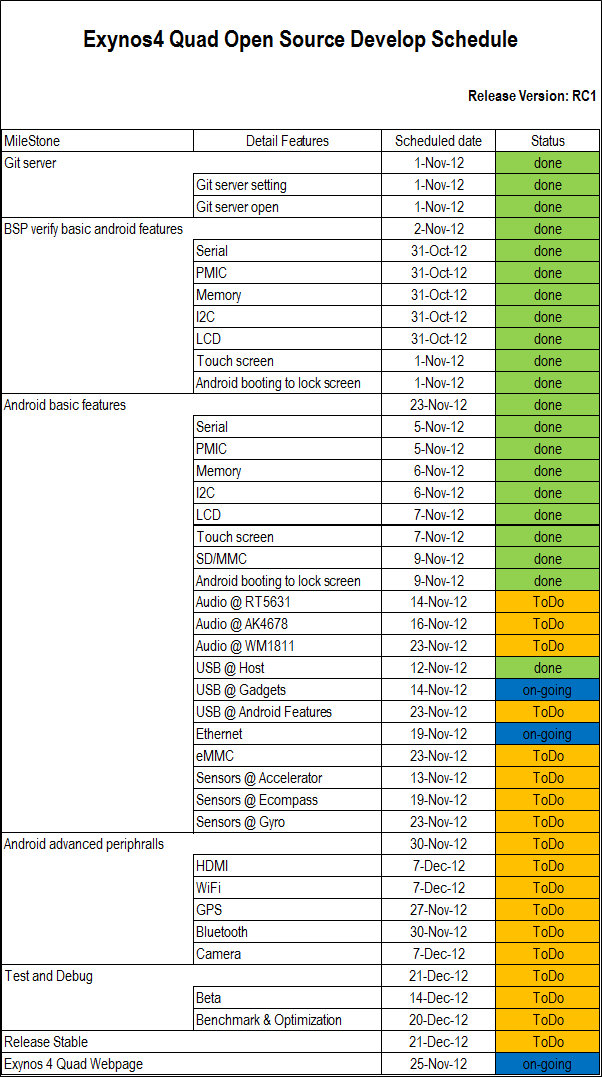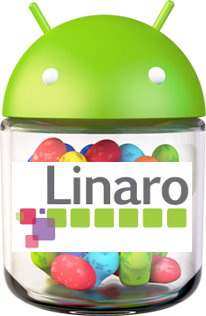If you’ve got an Exynos 4412 development board such as Hardkernel ODroid-X or Insignal Origen Quad, or even other devices based on Exynos 4412 such as the Samsung Galaxy S3, you may be interested to know the open source development schedule for the platform as show below (Source: Origenboard.org). Samsung already released the source code for Samsung Galaxy S3 in June, but this should add more recent drivers and support for more peripherals. The stable release should be available on the 21st of December 2012, but in the meantime, you could always pickup features earlier as they are being implemented. The code is available in http://git.insignal.co.kr/ (Git repository) and is maintained by both Insignal and Samsung. Jean-Luc Aufranc (CNXSoft)Jean-Luc started CNX Software in 2010 as a part-time endeavor, before quitting his job as a software engineering manager, and starting to write daily news, and reviews full time later in 2011. […]
openSUSE 12.2 for ARM is Now Available for Beagleboard, Pandaboard, Efixa MX and More
The first stable release of openSUSE for ARM has just been announced. openSUSE 12.2 for ARM is officially available for the Beagleboard, Beagleboard xM, Pandaboard, Pandaboard ES, Versatile Express (QEMU) and the rootfs can be mounted with chroot, but “best effort’ ports have been made for Calxeda Highbank server, i.MX53 Loco development board, CuBox computer, Origen Board and Efika MX smart top. Work is also apparently being done on a Raspberry Pi port which should be available for the next release. openSUSE developers explains that almost all of openSUSE builds runs on these platforms (about 5000 packages). Visit “OpenSUSE on your ARM board” for download links and instructions for a specific ARM board. More details are available on the wiki page. openSUSE has limited resources for ARM development, so If you’d like to help with development (e.g. fixing builds), visit ARM distribution howto page to find out how to get […]
Linaro 12.09 Release with Kernel 3.6 and Android 4.1.1
Linaro release 12.09 has just been announced, and includes Linux Kernel 3.6-rc6 and Android Jelly Bean. This release provides further improvement to Android Jelly Bean, Android benchmark characterization, an ARMv8 OpenEmbedded image, UEFI bootloader support for Vexpress, origen and pandabords, and some improvement to big.LITTLE and power management. Here are the highlights of the release: Android All Linaro patches are now available on Jelly Bean. Accelerated graphics is now available on Snowball Jelly Bean build. AndEBench, AndEBench Java, Linpack, CaffeineMark, Antutu 2D and 3D, NBench, Quadrant, I/O Benchmark, Vellamo benchmark hotspot characterization available. An Origen tracking build is available and will be released this cycle as a Linaro Evaluation Build (LEB). Audio works on Origen running Jelly Bean (WAV file only). A Monkeyrunner script to run Streamline has been completed. First rev of the NI PXIe-4154 based power measurement system is created. See http://www.youtube.com/watch?v=9bKyuxLl4iw&feature=plcp In-tree AOSP tests have been automated. […]
Linaro 12.08 Release with Kernel 3.6 and Android 4.1.1 Jelly Bean
Linaro release 12.08 includes Linux Kernel 3.6-rc2 and is the very first release with Android Jelly Bean (4.1.1-R4). The Android platform team has managed to port Android Jelly Bean to all their main development platforms: Versatile Express, Versatile Express RTSM, Samsung Origen, TI PandaBoard, ST Ericsson Snowball, as well as Samsung Galaxy Nexus smartphone. They’ve also added TINY_ANDROID, a minimal Android build that can be used for kernel development, toolchain work and other development where users only need a console. It’s possible to get the source code, build it and access the shell within 10 minutes. U-boot-Linaro has been updated and is now based on the latest upstream release v2012.07. Next month, we might be able to see a preliminary port of Android on 64-bit platform (ARMv8). Here are the highlights of the release: Android Automated Methanol (http://gitorious.org/methanol) browser benchmarking in Linaro Android. Automated over 100 Jelly Bean AOSP tests. […]
Instructions to Build Android Jelly Bean on Pandaboard and Origen Boards
About 2 weeks ago, Linaro showed Android Jelly Bean running on Origen board with hardware accelerated, and last week they provided instruction to build Jelly Bean for the Pandaboard (OMAP4430) and the Origen board (Exynos 4212). Android Jelly Bean for Pandaboard: Pre-build Image and Build Instructions The fastest way to try Android Jelly Bean on the Pandaboard is to download the latest binaries available at https://android-build.linaro.org/builds/~linaro-android/panda-jb-gcc47-tilt-stable-blob in a PC running Ubuntu. For example (12/08/2012): wget http://snapshots.linaro.org/android/~linaro-android/panda-jb-gcc47-tilt-stable-blob/24/target/product/pandaboard/system.tar.bz2 wget http://snapshots.linaro.org/android/~linaro-android/panda-jb-gcc47-tilt-stable-blob/24/target/product/pandaboard/boot.tar.bz2 wget http://snapshots.linaro.org/android/~linaro-android/panda-jb-gcc47-tilt-stable-blob/24/target/product/pandaboard/userdata.tar.bz2 Install linaro-image tools: sudo add-apt-repository ppa:linaro-maintainers/tools sudo apt-get update sudo apt-get install linaro-image-tools Insert an SD card, make sure it is not mounted and flash it with the firmware (Replace /dev/sdc by the corresponding drive in your system): ./linaro-image-tools/linaro-android-media-create –mmc /dev/sdc –dev panda –system system.tar.bz2 –userdata userdata.tar.bz2 –boot boot.tar.bz2 Finally install the graphics libraries: wget http://people.linaro.org/~vishalbhoj/install-binaries-4.0.4.sh chmod a+x install-binaries-4.0.4.sh ./install-binaries-4.0.4.sh Remove the SD card from your PC, and insert it […]
Android Jelly Bean on Samsung Origen Development Board (Video)
Linaro Android team has started to port Android Jelly Bean to Samsung Origen board (powered by Exynos 4 dual core processor) and can now show Android 4.1 running on the board with hardware accelerated graphics. This is a preliminary image: the touchscreen, graphics, adb works, and you can use keyboard and mouse as input devices, but Wi-Fi, Bluetooth and multimedia (hardware video decoding) still have to be worked on. If you have an Origen board, you can give it a try by downloading the binaries @ https://android-build.linaro.org/builds/~linaro-android/origen-jb-gcc47-samsunglt-stable-blob/, and follow the instructions to create a bootable SD card with linaro-media-create. Jean-Luc Aufranc (CNXSoft)Jean-Luc started CNX Software in 2010 as a part-time endeavor, before quitting his job as a software engineering manager, and starting to write daily news, and reviews full time later in 2011. www.cnx-software.com
Linaro 12.07 Release with Kernel 3.5 and Android 4.0.4
Linaro has released version 12.07 based on Linux Kernel 3.5-rc3 and Android 4.0.4. Some work has been done on Jelly Bean (but the port is for next month), several benchmark tools have been added to LAVA as Linaro wants to provide standard benchmarks for Android, Linaro ALIP image now uses LXDE by default with a smaller image and improved performance, and Open Embedded images are now available (minimal and LAMP stack). Here are the highlights of the release: Android Jellybean baselines for Galaxy and Panda with Linaro extra’s available Android Benchmarking apps were deployed for pandaboard, snowball and origen in LAVA including: vellamo, quadrant, nbench, linpack, glbenchmark, geekbench, caffeinemark, antutu, andebench Improved native Benchmarks variance on Android to 1%, working on Java variance ICS “tests” builds now produced by default and test lists generated Open overlay tarballs working pm-qa’s cpuidle cpufreq cpuhotplug sched_mc suspend integrated into the Android builds Linaro […]
Linaro 12.06 Release with Kernel 3.5 and Android 4.0.4
Linaro has released version 12.06 based on Linux Kernel 3.5-rc3 and Android 4.0.4 (r2.1). This release brings further multimedia enablement for Android as well as some improvement to perf for Android, improved instructions & scripts for multi-arch on Ubuntu, and lots of little improvements and bugs fixes. Here are the highlights of the release: Android Multimedia enablement on AOSP, patches are in review. Most of the benchmarking applications have been automated via Monkeyrunner, working on PandaBoard and Snowball. Update panda-ics-gcc47-tilt-tracking-blob build to the TI LT 3.4 kernel. USB camera preview and still capture forward ported to tilt-tracking. 3D graphics and multimedia working on tilt-stable. IOMMU for Origen’s Multi format codec (MFC) enabled. IOMMU for Origen’s FIMC enabled. (FIMC stands for Fully Interactive Mobile Camera, and it’s used for camera input). Snowball upgraded to Android 4.0.4. Cortex strings landed in Linaro Android and submitted to AOSP (https://android-review.googlesource.com/#/c/38031/). This is part of […]





